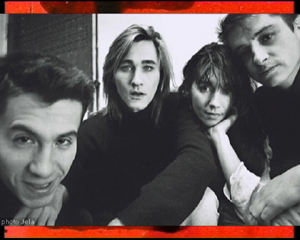|
EKV: As It Once WasDirected by Dusan Vesic Review by Rada Djurica One documentary at the sixth annual Zagreb
Film Festival captured a great deal of attention but won no awards;
yet it definitely sold tickets in Zagreb City Evropa Cinema. It is the
Serbian documentary EKV: As It Once Was, about the rise and fall
of the ex-Yugoslavian post-punk electro band from the '80s EKV: Catherine
the Great. Will I'm sure it's unlikely that anyone outside of the ex-Yugoslavian
borders has been introduced to this band, one of the members, Bojan
Pecar, played with the British band Mission for a while. In the mid- to late '70s, the punk rock explosion inspired many worldwide musicians, who were the rejecting constraints of big-budget production and '70s glamour in order to bring rock 'n' roll back to its rebellious roots, going "underground." In the beginning of the post-punk period, another breed of musician took off. This new and different direction threw off the hegemony of the electric guitar in pop and rock music, embracing electronic music, especially synthesizers, which were easy to play and handle, and which presented a whole new aural spectrum. Key synthpop-influenced groups and artists from the early to mid-1980s include The Eurythmics, Depeche Mode, The Talking Heads, The Pet Shop Boys, New Order, Ultravox, Human Leaque, and The Cure. All this happened to old Yugoslavia and Belgrade, as well. Like other
musicians in respectively poor countries, heroin went hand in hand with
the music. All the bigger cities in old Yugoslavia were infected (Split,
Zagreb, Ljubljana, Skoplje, Sarajevo), as music and cheap drugs rose
to prominence together. This documentary tells an emotional story about life and death, creativity,
love and hate, and the rise and fall of one of the biggest post-punk
electro-rock bands in the '80s in ex-Yugoslavia. Catherine the Great,
or EKV, was truly one of the most successful and influential bands to
come out of former Yugoslavia. Their trademark characteristics were
subtle music and hermetic, introspective, and metaphorical lyrics, sung
by leading singer Milan Mladenovic. If you could have seen the crying
young women at his funeral, you could imagine what this lead singer
and his band represented to the youth of the '80s. During its existence, EKV built up a a following of devoted fans, which greatly intensified and expanded after the death of its front man, Milan Mladenovic, in 1994. At the same time, he inspired brand new musicians, many of whom were different from him. None of the members of EKV band are alive today. They died from drug abuse or AIDS, caused infected needled, all within ten years, just as the civil war in ex-Yugoslavia started. This documentary tells the explicit story about the bizarre connection between the country falling apart in the '90s and the New Wave musicians of old Yugoslavia. Those interviewed in the film address conspiracy theory and drug trafficking from the communist leaders, to musicians and the creative process of the New Wave generation. The destiny of this band symbolized the end of a generation just before old Yugoslavia felt apart, and therefore it is a tragic, intriguing and very important story about causes and consequences, and the glorious beginning and tragic end of an entire generation. Most of the survivors of this generation went emigrated abroad. The poorest stayed in the country and now live stuck in the past, unable to move on. In a way, many of us are still the same. Indeed, many authors and musicians today in all the countries of ex-Yugoslavia are still under the influence of this band. The band made seven studio-produced albums and a couple of concert editions, but they have left the biggest mark on current music in Serbia. The documentary was produced by PDV (owned by the director of the film,
Dusan Vesic). |
